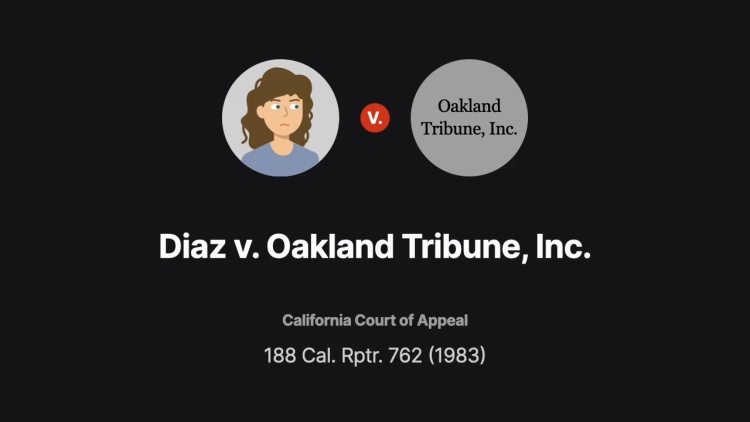Diaz v. Oakland Tribune, Inc.
California Court of Appeal
139 Cal. App. 3d 118, 188 Cal. Rptr. 762 (1983)
- Written by Craig Conway, LLM
Facts
In 1975, Toni Diaz (plaintiff) underwent corrective surgery to change her gender from male to female. After the procedure, Diaz appeared, behaved, and was accepted by the public as a woman. Diaz kept the surgery a secret from everyone except her immediate family and closest friends and never sought to publicize her transformation. She changed her name from Antonio to Toni, made the necessary changes to her high school records, social security records, and driver’s license. While serving as student body president of the College of Alameda, Diaz was involved in a controversy with college administrators over the misuse of student funds. While investigating the story, Sidney Jones (defendant), a reporter for the Oakland Tribune (the Tribune) (defendant), was confidentially told about Diaz’s surgery. After confirming Diaz’s former gender via police records for a prior arrest, Jones wrote a story about Diaz’s gender transformation. After reading the article, Diaz was forced to reveal her status, became very depressed and suffered other mental and physical infirmities. Diaz sued the Tribune and Jones for invasion of privacy. Diaz did not allege that any of the published information was untrue. A jury found for Diaz and awarded her $250,000 in compensatory damages and $525,000 in punitive damages ($25,000 against Jones and $500,000 against the Tribune). The Tribune and Jones appealed.
Rule of Law
Issue
Holding and Reasoning (Barry-Deal, J.)
What to do next…
Here's why 904,000 law students have relied on our case briefs:
- Written by law professors and practitioners, not other law students. 47,100 briefs, keyed to 995 casebooks. Top-notch customer support.
- The right amount of information, includes the facts, issues, rule of law, holding and reasoning, and any concurrences and dissents.
- Access in your classes, works on your mobile and tablet. Massive library of related video lessons and high quality multiple-choice questions.
- Easy to use, uniform format for every case brief. Written in plain English, not in legalese. Our briefs summarize and simplify; they don’t just repeat the court’s language.





